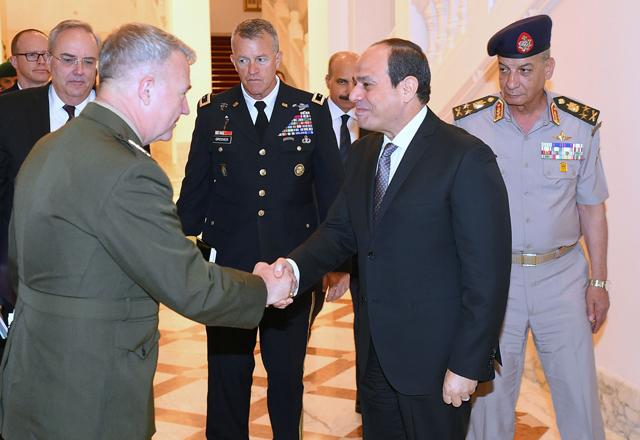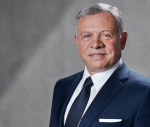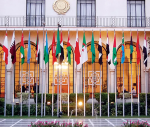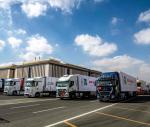You are here
Who is targeting the Muslim Brotherhood?
By Reuters - May 04,2019 - Last updated at May 04,2019
ISTANBUL — US President Donald Trump is working to designate the Muslim Brotherhood as a foreign terrorist organisation, a move that would bring sanctions against one of the Arab world's oldest and most influential Islamist movements.
The Muslim Brotherhood, founded more than 90 years ago in Egypt, has survived repeated crackdowns at home and has a network of groups across the Middle East, some directly linked to the Egyptian organisation and others more loosely affiliated.
The Muslim Brotherhood's opponents, including several autocratic Arab states, say it is a dangerous terrorist group which must be crushed. The movement says it publicly renounced violence decades ago and pursues an Islamist vision using peaceful means.
After the Egyptian uprising which overthrew president Hosni Mubarak in 2011, the Muslim Brotherhood won the country's first free presidential elections. It was toppled by the military following widespread protests and was outlawed soon after.
Many of its leaders, including former president Mohamed Morsi and Supreme Guide — or spiritual leader — Mohamed Badie, have been sentenced to death after mass trials of thousands of Muslim Brothers. Egypt's allies Saudi Arabia and the United Arab Emirates (UAE) have also cracked down on the group.
How does it operate?
The Muslim Brotherhood was founded in Egypt in 1928 by Hassan Al Banna, a school teacher and preacher who called for a religious revival and the establishment of a caliphate under Sharia law.
Banna's Muslim Brotherhood rejected the secularisation sweeping through the Middle East, and argued that Arab nationalism was not the way to challenge Western colonial control in the region.
His organisation was built on cell structures, with lengthy inductions and education for new members. Those largely clandestine processes make assessing its capabilities hard.
Its expansion across the Middle East also means it is identified with a variety of organisations, from armed groups to charities.
Where is it present?
Many political parties and campaign groups in the Middle East and further afield trace their roots to the Muslim Brotherhood. Not all use the Muslim Brotherhood's name or make their links explicit.
Thousands of Egyptians fleeing Gamal Abdel Nasser's clampdown in the 1950s and 1960s brought Muslim Brotherhood ideas to Saudi Arabia and other Gulf states, which welcomed them at the time as a counterbalance to Nasser's revolutionary nationalism.
From North Africa to Yemen, prominent Islamist political groups have also been inspired by the Muslim Brotherhood.
In Syria the movement helped foment an armed uprising in 1982 in Hama city that was crushed by a forceful armed campaign.
Hamas, which won the last Palestinian parliamentary elections in 2006, was founded as the Palestinian branch of the Muslim Brotherhood. Hamas is designated a terrorist organisation by the United States and European Union.
In Jordan, a close US ally, the Muslim Brotherhood is part of a political opposition grouping which won seats in 2016 elections.
The Islamist-rooted AK Party of Turkey's President Recep Tayyip Erdogan supported Morsi's short-lived Egyptian government, and many Egyptian Muslim Brotherhood supporters have found refuge in Turkey. Qatar also hosts prominent Muslim Brotherhood figures.
Why it is banned in Saudi Arabia and the UAE?
The United Arab Emirates' outspoken opposition to the Muslim Brotherhood since 2011 has been a big cause of the UAE rift with Qatar — seen in the Gulf as a supporter of the group.
Like Saudi Arabia, the UAE's conservative Sunni ruling family views the Muslim Brotherhood as an ideological competitor and sees its promotion of political activism, including support for elections, as a direct threat to its dynastic system of rule.
Saudi Arabia formally designated the Muslim Brotherhood a terrorist organisation in 2014 and banned it in the kingdom.
In the 1950s, Saudi Arabia gave shelter to thousands of Muslim Brotherhood activists facing jail and repression in Egypt, Syria and elsewhere. The Brotherhood soon gained influence in the kingdom, contributing to the politicisation of Saudi Islam.
The break in ties happened after Iraq's 1990 invasion of Kuwait and Saudi involvement in a 2003 US-led invasion of Iraq. The group openly criticised the US military presence in the kingdom and its affiliates sought radical political reforms.
The authorities crushed the campaign but blamed the movement for sowing dissent, and in 2002 the interior minister said the Muslim Brotherhood was the "source of all evils in the kingdom".
Why is Trump
acting now?
Some other countries have already declared the Brotherhood terrorists. Syria made Muslim Brotherhood membership a capital offence in 1980 and Russia banned the Muslim Brotherhood in 2003.
More recently Egypt banned the group after Morsi's overthrow. Soon afterwards Saudi Arabia and the United Arab Emirates declared it a terrorist organisation.
Egyptian President Abdel Fattah Sisi asked Trump to designate the group when he visited the White House three weeks ago, a US official said. That would bring Trump into step with close Arab allies who he sees as central to countering Iran.
Egypt's ally in Libya, eastern commander Khalifa Haftar, in 2014 branded the Muslim Brotherhood an "international spy network".
What have others said?
A 2015 British government review said the group was not "linked to terrorist related activity in and against the UK". In the Middle East, it saw a "complex and situational relationship, in a region where political violence was and is common".
It said the group historically had "engaged politically where possible. But they have also selectively used violence and sometimes terror in pursuit of their institutional goals".
Related Articles
The United Arab Emirates has formally designated the Muslim Brotherhood and local affiliates as terrorist groups, state news agency WAM reported on Saturday citing a Cabinet decree.
Egyptian and Qatari intelligence officials have met in Cairo to discuss reconciliation as part of Saudi-brokered efforts to end an 18-month standoff over Doha's support of the Muslim Brotherhood, security and diplomatic sources said.
CAIRO — An Egyptian military court on Wednesday sentenced nearly 300 people to prison terms, including some who in 2014 attempted
















